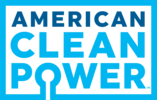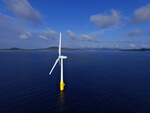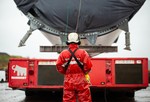News Release from American Clean Power Association (ACP)
Wind Industry Profile of
07/16/2009
USA - Renewable electricty standard will not create jobs unless strengthened
This morning, members of America’s wind power industry laid out a compelling case to strengthen the proposed Congressional renewable electricity standard (RES) in order to protect American jobs and maintain America’s leadership status in the increasingly competitive global wind power industry.
Testifying before the Senate Environment and Public Works Committee, G.E. Vice Chair and Energy Infrastructure President and CEO John Krenicki called for any federal RES passed this year to be significantly stronger than proposals now on the table.
Legislation passed by the House and a Senate committee last month, Krenicki said, fall far short of what is needed and would have “disastrous” consequences for the domestic wind industry in the near term. Current proposals, due to carve-outs in definitions and calculations of the standard, do not drive new renewable energy deployment in the near term.
“While the U.S. struggles to determine the future of clean energy, other countries around the world are setting aggressive near-term and long-term standards and incentives to create large domestic markets for renewable energy,” Krenicki said. “Both the RES passed by the House of Representatives and the RES approved by the Senate Energy and Natural Resources Committee last month are far too weak to drive growth. The current RES proposals for 2012 – anywhere from 3 to 6 percent of total U.S. electricity generation – are essentially equal to or below the status quo.”
“Massive new investments in manufacturing will not be made in the U.S. today based on the hope of a strong carbon price signal 10 years from now,” explained Krenicki. “It would take a 12% renewable electricity standard by 2012, with reasonable percentages to be satisfied by energy efficiency measures, to enable U.S. wind deployments to continue on the current growth trajectory,” Krenicki said. “Such a standard would also help drive dollars to small companies and developers waiting for stimulus checks to begin rolling out, and help sustain a domestic industry that cannot wait for longer term carbon legislation to come into effect.”
The Senate is currently holding hearings on climate and energy legislation and is expected to mark up legislation in September. The House passed its version of the bill, the American Clean Energy and Security Act, late last month. Leading voices in the wind industry echoed Krenicki’s call for more robust U.S. policy to support renewable energy.
“The U.S. wind industry is on the cusp of either expanding upon the rapid gains made in recent years or giving up those gains to foreign competitors, and national energy policy – namely, a strong RES – will make the difference,” said Denise Bode, CEO of the American Wind Energy Association (AWEA). “Unfortunately, the current RES proposals do not seize the historic opportunity we have today to build up the nation’s manufacturing base and revitalize our economy.”
AWEA last week released its annual “20% Wind Report Card,” which showed that while wind accounted for 40% of the nation’s new energy generating capacity in 2008, wind farm development in 2009 is expected to slow as a result of the economic downturn, leading to a drop in wind turbine and wind turbine component orders. Meanwhile, strong RES targets have the ability to produce hundreds of thousands of jobs in the near and long term, according to a recent study by the Blue-Green Alliance. The U.S. wind power industry added or expanded more than 70 manufacturing facilities in the past two years (2007-2008), including over 55 in 2008 alone, according to AWEA.
“We are at an extraordinary point in the U.S. wind energy industry today, with the U.S. having pulled into #1 position last year and invested in a record number of manufacturing facilities,” said Sampson A. Brown, President/CEO of Knight & Carver Wind Group, a blade manufacturing and repair company with facilities in California and South Dakota. “Congress needs to lock in the industry’s momentum with a strong RES. Now is the time for decisive action – not only for our company and our industry, but for the nation’s energy future.”
Both Europe and China have publicly committed to strong renewable energy policies in the near term. The EU’s Renewable Energy Directive commits member nations to an average of 25% renewables between 2011 and 2012. China has doubled its wind power capacity in each of the last four years, and expects to have 30,000 megawatts of wind installed by the end of 2010 – 10 years ahead of a target set last year. The U.S. currently has over 28,000 megawatts of wind power capacity.
“A strong RES is a pro-jobs policy that we can’t afford to pass up,” said Parthiv Amin, President of Winergy, a company based in Illinois that manufactures gearboxes for wind turbines. “A robust RES would send a clear signal in the US market, and would unleash a wave of investment and job creation in our domestic manufacturing base.”
About the American Wind Energy Association (AWEA):
AWEA is the national trade association of America’s wind industry, with more than 1,900 member companies, including global leaders in wind power and energy development, wind turbine manufacturing, component and service suppliers, and the world’s largest wind power trade show. AWEA is the voice of wind energy in the U.S., promoting renewable energy to power a cleaner, stronger America. Look up information on wind energy at the AWEA Web site. Find insight on industry issues at AWEA’s blog Into the Wind. Join AWEA on Facebook. Follow AWEA on Twitter.
Testifying before the Senate Environment and Public Works Committee, G.E. Vice Chair and Energy Infrastructure President and CEO John Krenicki called for any federal RES passed this year to be significantly stronger than proposals now on the table.
Legislation passed by the House and a Senate committee last month, Krenicki said, fall far short of what is needed and would have “disastrous” consequences for the domestic wind industry in the near term. Current proposals, due to carve-outs in definitions and calculations of the standard, do not drive new renewable energy deployment in the near term.
“While the U.S. struggles to determine the future of clean energy, other countries around the world are setting aggressive near-term and long-term standards and incentives to create large domestic markets for renewable energy,” Krenicki said. “Both the RES passed by the House of Representatives and the RES approved by the Senate Energy and Natural Resources Committee last month are far too weak to drive growth. The current RES proposals for 2012 – anywhere from 3 to 6 percent of total U.S. electricity generation – are essentially equal to or below the status quo.”
“Massive new investments in manufacturing will not be made in the U.S. today based on the hope of a strong carbon price signal 10 years from now,” explained Krenicki. “It would take a 12% renewable electricity standard by 2012, with reasonable percentages to be satisfied by energy efficiency measures, to enable U.S. wind deployments to continue on the current growth trajectory,” Krenicki said. “Such a standard would also help drive dollars to small companies and developers waiting for stimulus checks to begin rolling out, and help sustain a domestic industry that cannot wait for longer term carbon legislation to come into effect.”
The Senate is currently holding hearings on climate and energy legislation and is expected to mark up legislation in September. The House passed its version of the bill, the American Clean Energy and Security Act, late last month. Leading voices in the wind industry echoed Krenicki’s call for more robust U.S. policy to support renewable energy.
“The U.S. wind industry is on the cusp of either expanding upon the rapid gains made in recent years or giving up those gains to foreign competitors, and national energy policy – namely, a strong RES – will make the difference,” said Denise Bode, CEO of the American Wind Energy Association (AWEA). “Unfortunately, the current RES proposals do not seize the historic opportunity we have today to build up the nation’s manufacturing base and revitalize our economy.”
AWEA last week released its annual “20% Wind Report Card,” which showed that while wind accounted for 40% of the nation’s new energy generating capacity in 2008, wind farm development in 2009 is expected to slow as a result of the economic downturn, leading to a drop in wind turbine and wind turbine component orders. Meanwhile, strong RES targets have the ability to produce hundreds of thousands of jobs in the near and long term, according to a recent study by the Blue-Green Alliance. The U.S. wind power industry added or expanded more than 70 manufacturing facilities in the past two years (2007-2008), including over 55 in 2008 alone, according to AWEA.
“We are at an extraordinary point in the U.S. wind energy industry today, with the U.S. having pulled into #1 position last year and invested in a record number of manufacturing facilities,” said Sampson A. Brown, President/CEO of Knight & Carver Wind Group, a blade manufacturing and repair company with facilities in California and South Dakota. “Congress needs to lock in the industry’s momentum with a strong RES. Now is the time for decisive action – not only for our company and our industry, but for the nation’s energy future.”
Both Europe and China have publicly committed to strong renewable energy policies in the near term. The EU’s Renewable Energy Directive commits member nations to an average of 25% renewables between 2011 and 2012. China has doubled its wind power capacity in each of the last four years, and expects to have 30,000 megawatts of wind installed by the end of 2010 – 10 years ahead of a target set last year. The U.S. currently has over 28,000 megawatts of wind power capacity.
“A strong RES is a pro-jobs policy that we can’t afford to pass up,” said Parthiv Amin, President of Winergy, a company based in Illinois that manufactures gearboxes for wind turbines. “A robust RES would send a clear signal in the US market, and would unleash a wave of investment and job creation in our domestic manufacturing base.”
About the American Wind Energy Association (AWEA):
AWEA is the national trade association of America’s wind industry, with more than 1,900 member companies, including global leaders in wind power and energy development, wind turbine manufacturing, component and service suppliers, and the world’s largest wind power trade show. AWEA is the voice of wind energy in the U.S., promoting renewable energy to power a cleaner, stronger America. Look up information on wind energy at the AWEA Web site. Find insight on industry issues at AWEA’s blog Into the Wind. Join AWEA on Facebook. Follow AWEA on Twitter.
- Source:
- American Wind Energy Association
- Author:
- Edited by Trevor Sievert, Online Editorial Journalist / Author: AWEA Staff
- Email:
- info@awea.org
- Link:
- www.awea.org/...
- Keywords:
- AWEA, wind energy, renewable energy, wind turbine, wind power, wind farm, rotorblade, onshore, offshore




























